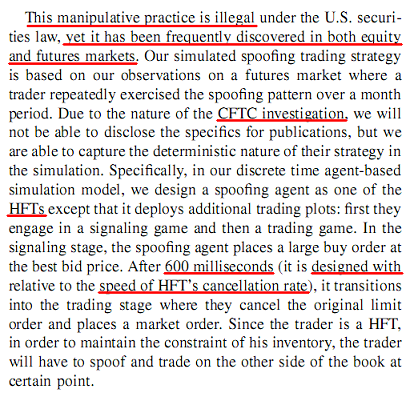This academic paper was published on November 7, 2011: The paper was co-authored by Andrei Kirilenko, who at that time was the Chief Economist at the CFTC. The paper establishes that there exists empirical evidence of High Frequency Trading (HFT) manipulation; specifically, a strategy known as Spoofing or "Hype and Dump": The paper affirms that spoofing is illegal and that the practice is frequently discovered in both stocks and futures: Stock markets are regulated by the SEC, and futures by the CFTC. Since Dr. Kirilenko was a primary author of the final SEC Flash Crash Report, and because of his role as the Chief Economist for the CFTC, we know he had regular high level discussions with the SEC. The paper, dated November 7, 2011, states it cannot disclose specifics due to an ongoing CFTC investigation. We firmly believe that investigation concluded with the fine against Panther Energy Trading for spoofing the oil futures markets. We discuss this case in this document which includes dozens of charts - many that show the 600 millisecond order cancellation rate discussed in the paper. We have since documented other events that closely resemble the Panther case, as well as thousands of other instances of questionable HFT trading practices. Let's review the time-line:
It took the CFTC a full 21 months to bring action against an HFT firm for manipulating oil futures. Maybe that is the normal pace for government action, but right now, it is the least of our concern. There is something far more egregious exposed by this academic paper than the glacial pace of enforcement action. It is painfully obviously that a thread of corruption has woven itself tightly into places outside the reach of the normal checks and balances that make our nation so great. This needs the immediate attention of anyone concerned about our financial markets, and most importantly, those that have the power to do something about it. Please read on. We can now answer the questions: What did the SEC know, and when did they know it?The paper clearly establishes that regulators (SEC and CFTC) were aware of illegal HFT manipulation strategies involving fast order cancellation rates. They knew this in November 2011, and probably many months earlier, considering the time it takes for an academic paper to get published. If we juxtapose this knowledge with recent statements made by regulators regarding HFT, manipulation and high order cancellation rates, we see denial, uncertainty and doubt. We have even witnessed the regulator being told to shut down an academic program which was investigating other HFT manipulation strategies. That program was headed by none other than Dr. Andrei Kirilenko. What we don't see are actions or policy changes, or even discussions about reigning in HFT manipulation. This lack of regulator attention shows up in the market: the evidence of the same behavior continues to pile up, to the point that HFT manipulators believe they are untouchable.Just this week we refuted a claim made by a recently formed HFT lobbyist group who stated that there was no value to rapidly placing and cancelling orders and therefore HFT wouldn't do that. The week before, the CEO of an exchange expressed no concern about flickering quotes, which are a manifestation of HFT rapidly placing and cancelling orders. Things are only going to get worse until a major market event suddenly jolts leaders into action. Or those with influence start the process of restoring the system of checks and balances that made our country great. We hope it is the latter, but given the level and depth of corruption we have witnessed, the outlook is grim. |
Nanex Research
Inquiries: pr@nanex.net




No comments:
Post a Comment